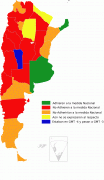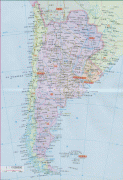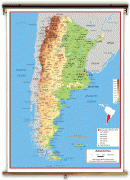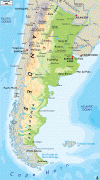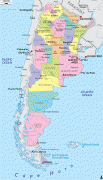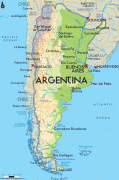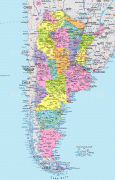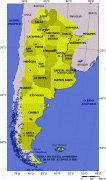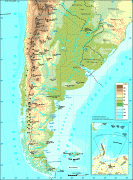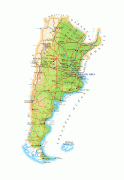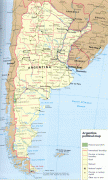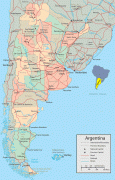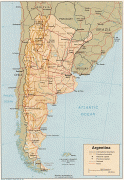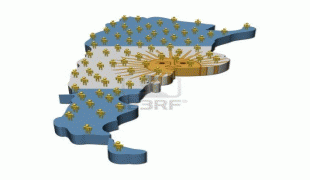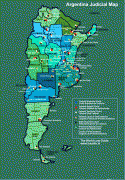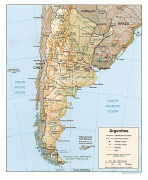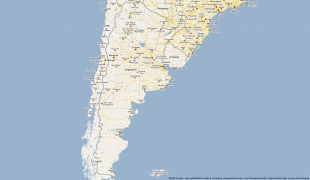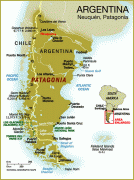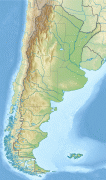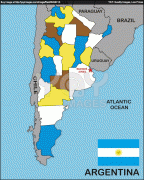Argentina (Argentine Republic)
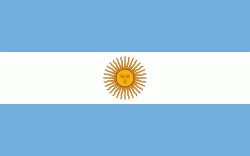 |
 |
| Flag of Argentina | |
The earliest recorded human presence in modern-day Argentina dates back to the Paleolithic period. The Inca Empire expanded to the northwest of the country in Pre-Columbian times. The country has its roots in Spanish colonization of the region during the 16th century. Argentina rose as the successor state of the Viceroyalty of the Río de la Plata, a Spanish overseas viceroyalty founded in 1776. The declaration and fight for independence (1810–1818) was followed by an extended civil war that lasted until 1861, culminating in the country's reorganization as a federation. The country thereafter enjoyed relative peace and stability, with several waves of European immigration, mainly Italians and Spaniards, radically reshaping its cultural and demographic outlook; over 60% of the population has full or partial Italian ancestry, and Argentine culture has significant connections to Italian culture.
The almost-unparalleled increase in prosperity led to Argentina becoming the seventh-wealthiest nation in the world by the early 20th century. In 1896, Argentina's GDP per capita surpassed that of the United States and was consistently in the top ten before at least 1920. Currently, it is ranked 62nd in the world. Following the Great Depression in the 1930s, Argentina descended into political instability and economic decline that pushed it back into underdevelopment, although it remained among the fifteen richest countries for several decades. Following the death of President Juan Perón in 1974, his widow and vice president, Isabel Perón, ascended to the presidency, before being overthrown in 1976. The following military junta, which was supported by the United States, persecuted and murdered thousands of political critics, activists, and leftists in the Dirty War, a period of state terrorism and civil unrest that lasted until the election of Raúl Alfonsín as president in 1983.
Argentina is a regional power, and retains its historic status as a middle power in international affairs. A major non-NATO ally of the United States, Argentina is a developing country that ranks 47th in the Human Development Index, the second-highest in Latin America after Chile. It maintains the second-largest economy in South America, and is a member of G-15 and G20. Argentina is also a founding member of the United Nations, World Bank, World Trade Organization, Mercosur, Community of Latin American and Caribbean States and the Organization of Ibero-American States.
The description of the region by the word Argentina has been found on a Venetian map in 1536.
In English, the name "Argentina" comes from the Spanish language; however, the naming itself is not Spanish, but Italian. Argentina (masculine argentino) means in Italian "(made) of silver, silver coloured", derived from the Latin "argentum" for silver. In Italian, the adjective or the proper noun is often used in an autonomous way as a substantive and replaces it and it is said l'Argentina.
The name Argentina was probably first given by the Venetian and Genoese navigators, such as Giovanni Caboto. In Spanish and Portuguese, the words for "silver" are respectively plata and prata and "(made) of silver" is plateado and prateado. Argentina was first associated with the silver mountains legend, widespread among the first European explorers of the La Plata Basin.
The first written use of the name in Spanish can be traced to La Argentina, a 1602 poem by Martín del Barco Centenera describing the region. Although "Argentina" was already in common usage by the 18th century, the country was formally named "Viceroyalty of the Río de la Plata" by the Spanish Empire, and "United Provinces of the Río de la Plata" after independence.
The 1826 constitution included the first use of the name "Argentine Republic" in legal documents. The name "Argentine Confederation" was also commonly used and was formalized in the Argentine Constitution of 1853. In 1860 a presidential decree settled the country's name as "Argentine Republic", and that year's constitutional amendment ruled all the names since 1810 as legally valid.
In English, the country was traditionally called "the Argentine", mimicking the typical Spanish usage la Argentina and perhaps resulting from a mistaken shortening of the fuller name 'Argentine Republic'. 'The Argentine' fell out of fashion during the mid-to-late 20th century, and now the country is referred to as "Argentina".
Currency / Language
| ISO | Currency | Symbol | Significant figures |
|---|---|---|---|
| ARS | Argentine peso | $ | 2 |
| ISO | Language |
|---|---|
| EN | English language |
| FR | French language |
| DE | German language |
| GN | Guarani language |
| IT | Italian language |
| ES | Spanish language |






